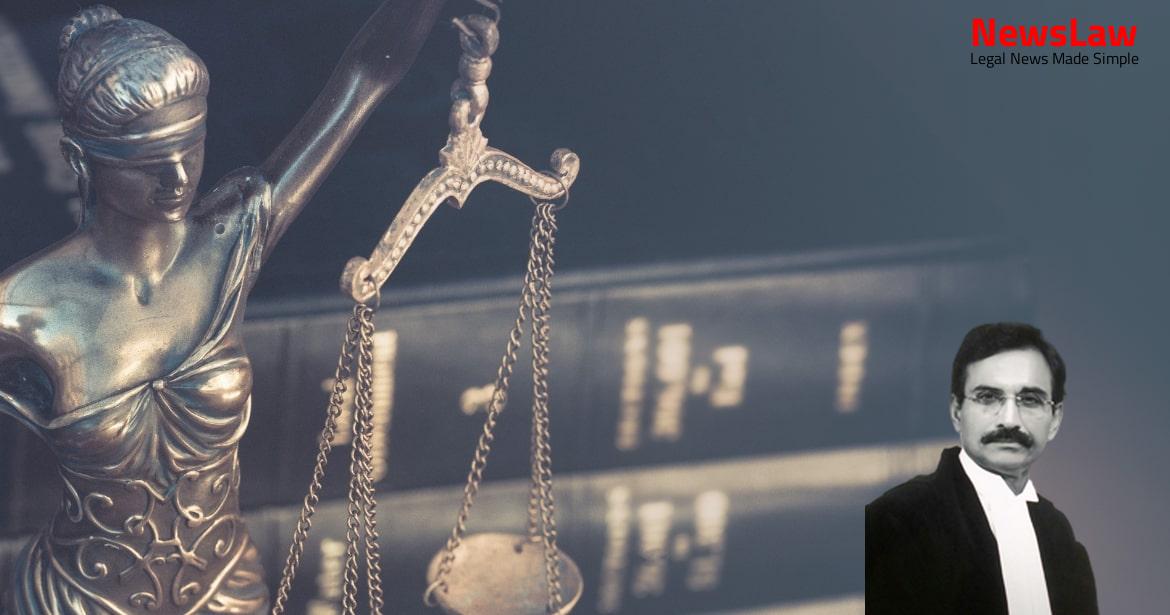In a recent legal case, the court provides a comprehensive analysis on the calculation of compensation in a fatal accident case involving complex financial aspects. The judgment emphasizes the importance of considering various factors such as loss of income, managerial skills valuation, and future prospects for the deceased’s dependents. Dive into the legal intricacies of this case to understand the court’s meticulous approach to determining a just and equitable compensation amount.
Facts
- The Deceased was a businessman with diverse interests in jewellery, textiles, exports, and transport.
- He left behind a widow, two minor children, and parents who were dependent on him.
- The collision resulted in the deaths of both drivers of the vehicles involved.
- The Deceased’s dependents filed a claim petition for Rs. 7,00,00,000/- alleging negligence on the part of the Ambassador Car driver.
- The Insurance Company disputed the claim, alleging that the Deceased was responsible for the accident and that the compensation sought was excessive.
- The injured occupants of the Ambassador Car also filed their respective claim petitions.
- During the proceedings, the father of the Deceased passed away.
- Deceased’s dependents were granted compensation of Rs 4,29,37,700/- with 7.5% interest per annum.
- The Tribunal held the driver of the Ambassador Car solely responsible for the accident, placing liability on the Insurance Company.
- The Deceased derived income mainly from returns on capital assets, which continued to benefit his legal heirs after his death.
- The High Court adjusted the compensation by setting the Deceased’s notional monthly salary at Rs 25,000 based on his educational qualification.
- The compensation was further reduced to Rs 57,90,000/- with 7.5% interest per annum on other conventional grounds.
- The High Court disagreed with the Tribunal’s approach to calculating compensation under ‘loss of income’ due to the Deceased’s transfer of interest in partnership firms to his minor children.
Also Read: Analysis of Cheating and Forgery in Passport Case
Arguments
- High Court erred in computing compensation based on notional income despite specific evidence presented by the Appellants
- Tribunal rightly relied on income tax returns and audit reports of the Deceased to calculate ‘loss of income’
- Deceased actively involved in running multiple businesses and undertook specialized courses
- Only deduction allowed in computing income is the tax payable as per precedent in National Insurance Co. Ltd. v Pranay Sethi
- High Court unjustly concluded Deceased earned no income from personal skills
- Computation of compensation under Section 168 of Motor Vehicles Act must be just, fair, reasonable, and equitable as per Pranay Sethi decision
- The determination of quantum for compensation under ‘loss of income’ must be liberal and not parsimonious, taking notional income as the basis.
- Compensation is a broader form of relief, different from damages, as highlighted in Yadava Kumar v Divisional Manager, National Insurance Co. Ltd.
- In cases of accidental death of people in business, the genuine determination for loss of income depends on ascertaining the Deceased’s contribution in running the business, which is fact-specific.
- Just compensation under Section 168 of the Act must be fair, reasonable, and equitable, as established in various decisions including Pranay Sethi by a Constitution Bench.
- The respondent argued for the reduction of compensation based on the Deceased’s income from capital assets, which were bequeathed to the dependents, as shown in income tax returns and audit reports.
Also Read: Discrepancy in Date of Birth: Court’s Legal Analysis
Analysis
- The documents on record indicate that ‘Lakshmi Complex’ was the sole source of rental income for the deceased, which was constructed jointly by the deceased and his partners.
- The rental records show that ‘Lakshmi Complex’ was leased out to more than ten commercial entities.
- The High Court set aside the computation of managerial skills as a percentage of rental income, stating that the income was from capital assets and not personal skills.
- The court determined the deceased’s income on a notional basis based on his educational qualifications.
- The deceased was actively involved in day-to-day management of business ventures, which were primarily his initiatives.
- The court emphasized the importance of including income from bank interests and investments in the compensation calculation.
- The involvement of the deceased in the businesses from their infancy and specialized training for administration were highlighted.
- The court discussed the transfer of ownership in businesses to children or dependents not guaranteeing continued benefits.
- The audit reports delineated the deceased’s share of income from the businesses, necessitating that the entire amount from business ventures be treated as income.
- The court emphasized the need to determine the value of managerial skills and other factual considerations in calculating compensation.
- Documents such as income tax returns and audit reports were considered reliable evidence to determine the deceased’s income.
- The court modified the compensation based on audit reports as no contrary evidence was presented.
- The income was divided into two parts – Income from Business Ventures and other Investments, and Income from House Property and Agricultural Land.
- The audit reports only included amounts specifically related to the deceased’s shares and interests in businesses.
- The compensation calculation considered the average income from the previous financial years.
- The income from ‘Lakshmi Complex’ and agricultural lands was also included in the calculation.
- The court referred to a past decision where the entire amount earned from house property was deducted while determining compensation.
- The decision in Shashikala was a split decision due to disagreement on whether future prospects should be considered for compensation of a deceased self-employed person.
- The matter was heard along with Pranay Sethi where the issue was conclusively decided regarding future prospects.
- The case was remitted back to a three-judge bench for redetermination of compensation, where the entire amount earned as income from house property was deducted.
- The remaining issue before the court is whether the entire amount under ‘Income from House Property and Agricultural Land’ should be deducted.
- The court is guided by the observations in State of Haryana v. Jasbir Kaur, noting that the land possessed by the deceased remains with his legal heirs.
- The rental amount sought to be deducted is considered as an investment.
- Managerial skills required for supervising the building are crucial and would require sophisticated contract management skills.
- The value of the managerial skills of the Deceased should be determined on the higher side.
- The deducted amount includes tax as per the decision in Pranay Sethi.
- The deducted amount also covers the cost of managerial skills for the Deceased’s agricultural lands.
Also Read: 2-1 Verdict Halts Conviction, Dissent Highlights Potential Flood of Unclear Legal Rulings
Decision
- The judgment under appeal of the High Court is set aside and the Appellants are held entitled to enhanced compensation.
- Income of the Deceased is computed by adding the amount awarded under the two parts (Rs 10,93,000/- + Rs 2,50,000/-), totaling Rs 13,43,000/-.
- Further compensation is granted under various heads, including Loss of Income, Funeral Expenses, Loss of Estate, Loss of Spousal Consortium, and Loss of Parental Consortium, totaling Rs 2,27,12,400/-.
- Forty percent of the income is added towards future prospects in line with the decision in Pranay Sethi, amounting to Rs 18,80,200/-, with 7.5% interest per annum from the date of filing the claim petition.
- An additional amount of Rs 2,50,000/- is awarded for the Deceased’s managerial skills.
- Compensation is determined at Rs 14,10,150/- per annum for Loss of Income after deducting one-fourth towards personal expenses, totaling Rs 2,25,62,400/- with a multiplier of 16.
Case Title: K. RAMYA Vs. NATIONAL INSURANCE COMPANY LTD. (2022 INSC 1044)
Case Number: C.A. No.-007046-007046 / 2022



